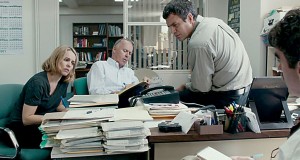Filmed with the same cast over a period of 12 years, it’s clear Richard Linklater’s Boyhood is angling to be the greatest coming-of-age movie of all time. At the start of the film Mason (Ellar Coltrane) is a cherub-faced six-year-old. Then, over nearly three hours he grows into an 18-year-old college student.
Mason’s path to adulthood is not easy. His childhood is frequently disrupted by abusive stepfathers and moving from place to place across Texas. It isn’t particularly exciting, but it is moving and authentic. Although it is scripted, Boyhood feels real, like a documentary, but it is structured as a series of short sketches in each phase of Mason’s life. Pop culture references litter the script, grounding the film in our world and making it easy to plot our own lives against Mason’s. Where were you when that Britney Spears song came out? Did you like The Dark Knight as much as Mason? It makes watching Boyhood a reflective, multilayered experience.
Despite its considerable length Boyhood feels intimate, mostly thanks to the narrow focus on Mason’s life. Secondary characters and their subplots arise and peter out as Mason moves from place to place, leaving some threads unresolved. What happened to his step-siblings after his mother flees their alcoholic father? Disturbingly, we never find out.
Although called “Boyhood”, this film actually explores what it means to be a man. Mason’s biological father, step-fathers, teachers and work supervisors—all men—exert their influence on him, trying to shape him in their image as they pontificate about manhood and responsibility.
Mason navigates them as best he can, heeding some and wisely ignoring others, and it’s a testament to his resilience that he is able to thrive. Still, there are no white knights; this is a film about the heroism of ordinary people.
Boyhood is bold and unusual in its structure and tone. It flaunts what audiences have come to expect from the cinema and given the 12-year production time it’s a small miracle it was ever completed. It’s unlikely there will ever be a film like this again, and it is the crowning achievement in Linklater’s strong and innovative career.
Rohan Salmond
Cross-platform editor
 JourneyOnline
JourneyOnline







